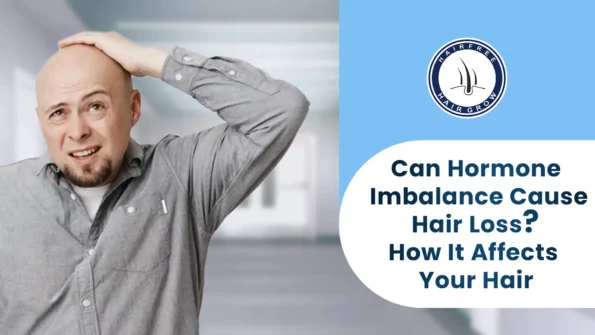Hormones play a significant role in controlling hair growth and hair loss, but many people aren’t aware of how this process works. Whether it’s experiencing unexpected hair fall or noticing gradual thinning, you might wonder, “Can hormone imbalance cause hair loss?” understanding the link between hormones and your hair is key to finding the right solutions. In this blog, we’ll explore how hormonal imbalances, particularly involving testosterone and DHT, can lead to hair loss and what you can do to manage it effectively.
What is Hormonal Hair Loss?
Hormonal hair loss happens due to imbalances in certain hormones, particularly in men and women. The primary hormone responsible is testosterone, which is naturally present in both men and women. In men, testosterone is more prevalent and can convert into a more potent form called Dihydrotestosterone (DHT). DHT is a major contributor to hair loss.
How DHT Affects Hair Follicles
When testosterone converts into DHT in the body, this DHT binds to receptors in hair follicles. Once attached, it weakens the hair follicles and disrupts their growth cycle. Over time, this causes the hair to become thinner, weaker, and eventually fall out. This process is the main reason behind male pattern baldness. Since testosterone levels are naturally higher in men, DHT production is also higher, leading to more significant hair fall.
Why Men Experience More Hair Loss
As mentioned earlier, testosterone levels are higher in men. Due to this, more DHT is produced, resulting in faster hair thinning and balding. In men, the balding pattern is usually more evident, typically starting at the temples or crown of the head.
In women, the situation is slightly different. While they also produce testosterone, the levels are much lower compared to men. Because of this, the conversion to DHT is minimal, leading to less hair fall in women. However, women can still experience hair thinning due to hormonal imbalances, especially during certain phases like pregnancy, menopause, or conditions like polycystic ovary syndrome (PCOS).
The Role of DHT Blockers
If you’ve researched hair fall treatments or are currently undergoing treatment, you’ve likely come across the term “DHT blockers.” These are medications or supplements that aim to reduce DHT levels in the body, helping to slow down or stop hair loss. DHT blockers play a critical role in preventing hair fall and promoting hair regrowth.
Identifying the Right Treatment
Hair loss is a complex issue, and it’s essential to understand your specific hair loss pattern. Patterns of baldness differ between men and women, which helps in determining the best treatment option. For instance, in men, baldness often follows a distinct pattern, such as receding hairlines or thinning at the crown. Women, on the other hand, may experience more diffuse thinning across the scalp.
It’s crucial to consult with a healthcare professional who can assess your hair loss type and recommend a suitable therapy. Early intervention is key. The sooner you start addressing the issue, the better the chances of slowing down hair loss and encouraging new growth.
Conclusion
Hormonal hair loss can be frustrating, but understanding the role hormones play is the first step toward finding the right solution. If you’re noticing unusual hair fall, it’s wise to visit HairFree HairGrow Clinic, we can guide you through effective treatments tailored to your needs. Addressing hormonal imbalances and managing DHT levels can make a significant difference in preserving and enhancing hair health.
Taking action at the right time can help you regain control over your hair and restore confidence in your appearance. Remember, the earlier you start hair treatment, the better the results you can achieve.
Schedule a consultation and take the first step towards restoring both your hair and confidence with our top-tier hair transplant services.

Written By
Dr. Pankaj Khunt
MD – Ukraine
Dr. Pankaj Khunt is a hair restoration expert specializing in hormonal hair loss. With extensive experience, he helps patients understand, Can Hormone Imbalance Cause Hair Loss? and provides personalized treatments to restore hair health and prevent further loss.
Disclaimer
We’ve made all possible efforts to ensure that the information provided here is accurate, up-to-date and complete, however, it should not be treated as a substitute for professional medical advice, diagnosis or treatment. See Detailed Disclaimers Here.

